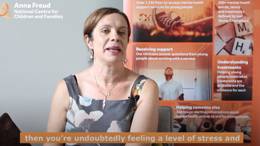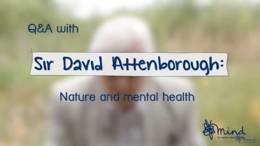Healthy coping strategies: video for young people
Learn about different practical coping strategies and how to use them in this video.
Young people will go through a lot of changes during adolescence, and these aren’t always easy to deal with. They may experience intense emotions and find these difficult to manage.
Having tried and tested coping strategies to deal with intense and difficult emotions is an important skill for young people.
In this video, Anna Freud Centre clinician Hannah Woods discusses the importance of healthy coping strategies for mental health.
She then demonstrates three different types of coping strategy:
- A grounding exercise
- A breathing exercise
- A CBT-style reframing thoughts activity
The video also features Sophie, a young person who explains how her chosen coping strategy, visualisation or guided imagery, helps her.
Using this resource
This resource is designed for:
- use by young people aged 14 and up
- use by individual young people
Staff could share this video with students to watch in their own time, or could play it to a small group of students during tutor or form time.
Curriculum links
|
England - RSHE |
Mental health and wellbeing By the end of secondary school pupils should know: · how to talk about their emotions accurately and sensitively, using appropriate vocabulary · how to recognise the early signs of mental wellbeing concerns. · common types of mental ill health (e.g. anxiety and depression) · the benefits and importance of physical exercise, time outdoors, community participation and voluntary and service-based activities on mental wellbeing and happiness. |
|
Northern Ireland – Learning for Life and Work |
Personal Health KS3 pupils should have opportunity to: · Investigate the influences on physical and emotional /mental personal health · Develop understanding about, and strategies to manage, the effects of change on body, mind and behaviour Key Stage 4 pupils should be enabled to: · develop an understanding of how to maximise and sustain their own health and well-being · reflect on, and respond to, their developing concept of self, including managing emotions and reactions to on-going life experiences |
|
Scotland – Health and Wellbeing |
Mental and emotional wellbeing · I understand the importance of mental wellbeing and that this can be fostered and strengthened through personal coping skills and positive relationships. I know that it is not always possible to enjoy good mental health and that if this happens there is support available. · I am learning skills and strategies which will support me in challenging times, particularly in relation to change and loss. |
|
Wales - Health and Wellbeing |
Progression step 4: I can identify different strategies to self-regulate my emotions in response to a range of experiences. Progression step 5: I can use my self-awareness to appreciate the complexity of my emotions and apply strategies to self-regulate them in a healthy way and to connect with others. |
Share your feedback with us
How would you rate this resource? (1-5 from poor to excellent)
Thank you for your feedback
Your input helps us improve and maintain the quality of our resource hub.
Sorry there was an error
Please try again later.
Related resources

Winter wellbeing: toolkit of resources
Resources for students and staff to help support good mental wellbeing this winter.
View resource
Mental Health Awareness Week 2025 toolkit of resources
Explore our Mental Health Awareness Week 2025 toolkits, created specifically for primary schools,...
View resource
Advice on managing stress at important moments video
Dr Sheila Redfern gives some tips on how to manage stress when waiting to hear from exam results, or...
View resource
Mental health and nature video
In this video, Sir David Attenborough talks about the links between mental health and nature.
View resource